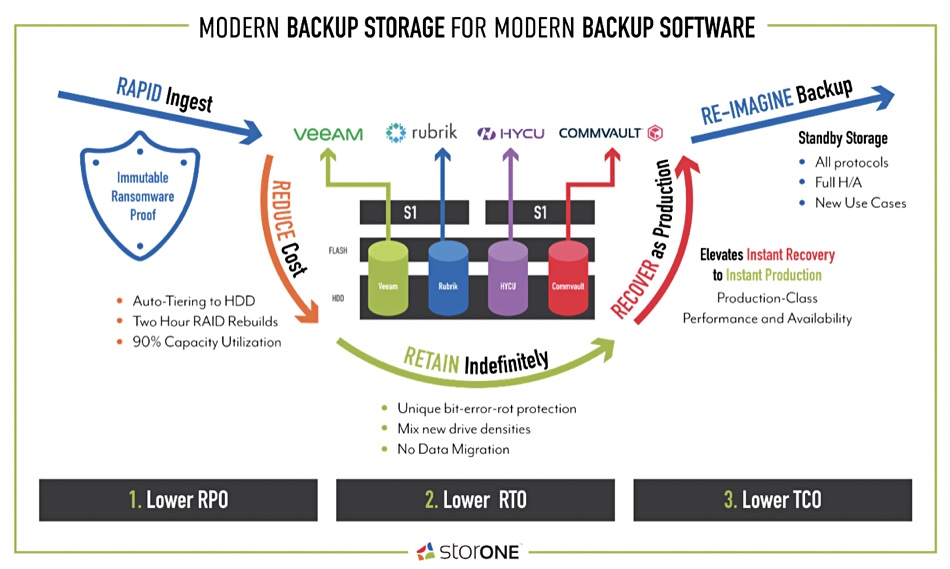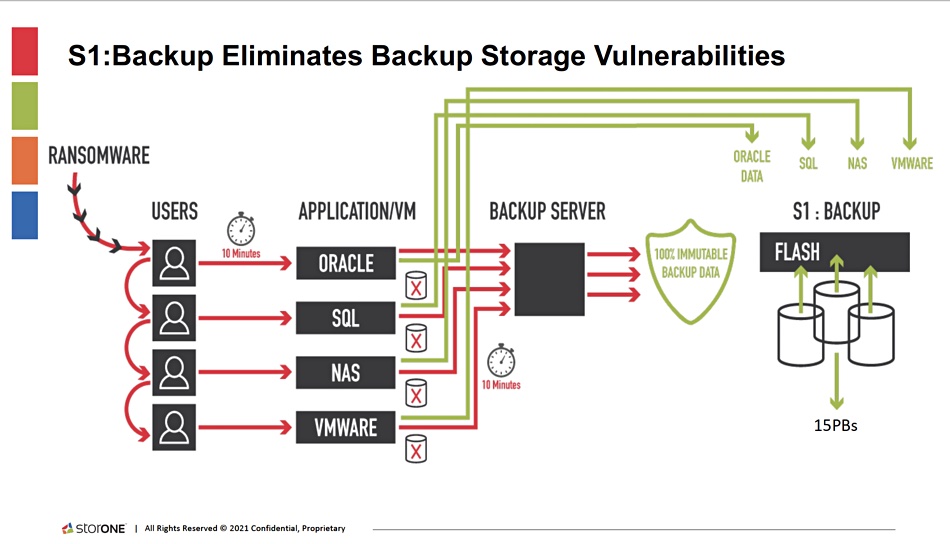Storage startup StorONE has developed a fast-recovering, ransomware-protecting, flash-to-disk auto-tiering version of its software called S1:Backup.
S1:Backup is a backup target for Commvault, HYCU, Rubrik and Veeam’s data protection software to provide fast ingest to ransomware-proof storage based on a 4–8 SSD flash tier with automated movement of older backups to high-capacity RAID-protected disk — more than 15PB of it. StorONE also has the ability for the clustered S1 array to be a standby production system, thus offering instant recovery.
Gal Naor, StorONE’s founder and CEO, said: “When we examined the points of exposure, we discovered a gap between backup software innovations and storage hardware capabilities, which led to vulnerabilities and higher cost. Legacy backup storage is the cause of that gap.”
In his view, “S1:Backup fills it and enables companies to complete their ransomware recovery strategy and extract the full value from modern backup software by eliminating ransomware concerns and elevating backup to deliver high-availability.”

StorONE claims S1:Backup delivers 100 per cent ransomware resiliency. In general, existing ransomware-protecting systems “force customers to use S3 for immutability. S1:Backup is the industry’s only solution that delivers immutability across all its protocols, including NFS, SMB, S3, iSCSI, Fibre Channel, and NVMe-oF.”
The company claims that high-capacity disk drives can be used in its S1:Backup because its software rebuilds a failed 18TB disk drive in three hours while other suppliers’ arrays can take days or even more than a week. And that situation only gets worse as capacities rise to 30TB and beyond. Newer, higher-capacity drives can be mixed with older, lower-capacity drives in the StorONE system as well, making scale-up more straightforward.

S1:Backup captures every backup job in an immutable state, handling hundreds of incoming incremental backup streams with 30-second snapshot intervals, and retains immutable copies indefinitely. Its software can operate at normal speed when its disks are 90 per cent full — there is no performance drop-off past the 50 per cent utilisation level.
This high-utilisation supports long-term storage. The software detects and corrects so-called bit-rot errors which can occur in long-term disk storage. Naor claims this is a future unique to StorONE. S1:Backup can also consolidate block-level incremental backups and create virtual fulls in minutes by using its 100TB+ flash tier.
StorONE also claims a pricing advantage — its pricing is openly available on its website so that customers can make comparisons with competing suppliers’ systems.
When the S1:Backup becomes a standby production system, backed-up VMs can operate in the array and use block, file and object protocols. The S1:Backup system can expand and be used for other use cases — such as archive, NAS, virtual machine storage, databases and even HPC and AI.
Comment
StorONE has close to 100 customers, Naor says. “We are growing fast from several aspects,” he told Blocks and Files, and mentioned repeat orders from existing customers as one example. “Repeat orders give us a lot of confidence.”
The alliances with Commvault, HYCU, Rubrik and Veeam, together with its S1:Backup features — such as ransomware protection, fast ingest and restore, stand-by production capability, and high disk utilisation and fast RAID rebuild capabilities — should make it an attractive alternative to other backup storage targets.
Naor thinks that the market is not yet ready for all-flash backup targets like FlashBlade because they are currently too expensive, and S1:Backup can provide similar or equivalent performance with cheaper archiving.








